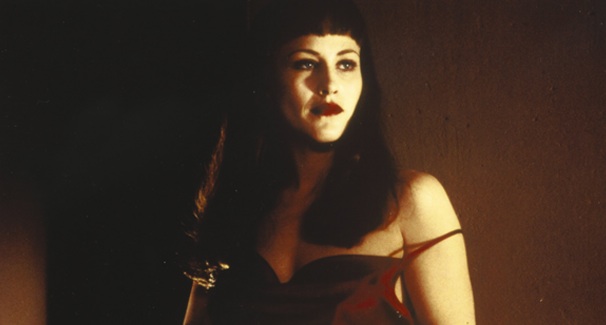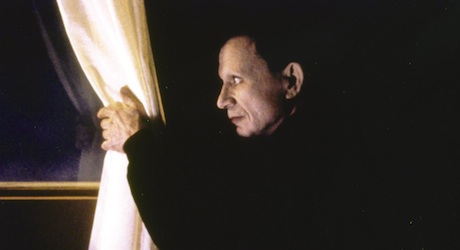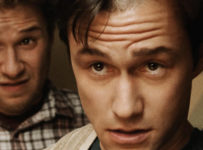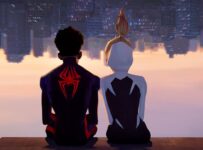David Lynch’s first film in five years was a deliberate move into the non-linear form, paving the way ahead for his explorations into the abstract. Lynch’s most bold experiment to date, forging new ground for the director and establishing his motifs for the next decade.

Legend has it that David Lynch came up with the concept of Lost Highway while driving home from the shoot of 1992’s Twin Peaks: Fire Walk with Me, the feature-length continuation of his cancelled cult TV series. Although that film, like the Palme d’Or winning predecessor Wild At Heart, was in contention for the top prize at the Cannes Film Fetsival, it was poorly received and many thought that Lynch had succumbed to his own indulgences.The combination of this and several TV series that didn’t pan out, including the short-lived On the Air, saw Lynch stay away from the cinema until 1997’s Lost Highway.
Fred Madison (Bill Pullman) is a successful and wealthy saxophonist, who is greeted one morning with the message that “Dick Laurent is dead.” Although suspecting that his wife Renee (Patricia Arquette) may be cheating on him, their lives take a turn when a series of video tapes start turning up on their doorstep, seemingly footage of their house and of them sleeping. Fred meets the Mystery Man (Robert Blake) at a party, who tells him that he is also at his house. Shortly after, another tape arrives showing Fred killing Renee, a crime which he is convicted and sentenced for. Things start to get weird(er) when Pete Dayton (Balthazar Getty), a young auto mechanic, mysteriously replaces Fred in his cell. Pete soon finds himself drawn into a world he doesn’t fully understand.
Arriving at a time when Lynch had all but dropped off the radar, Lost Highway appears to raise a very deliberate middle finger to critics who had written off his previous work. Quite consciously heading down the lost highway of abstraction, one that would ultimately lead him to Mulholland Dr. and the Inland Empire opus, Lost Highway is also his most unabashedly surreal works, filled with the kind of obfuscations that are designed to defy typical classification. For this is a film in two parts, one that gives the audience the expected exposition and mystery, and another that is an artist exploring the inner workings of the human mind. It is fair to say that the film is fractured, much like the psyche it aims to represent.
If the first half of the film is a piece of minimalist art, then the second is a noirish thriller that explores Lynch’s favourite theme of duality. Picking up where Twin Peak‘s BOB left off, Pete and Fred share a destiny, and seemingly a woman. Taking a leaf out of Alfred Hitchcock’s playbook, who Lynch could almost be described as a late twentieth-century double of, Vertigo is channelled in the dual roles for Arquette: one blonde and one brunette. Indeed, as Thierry Jousse points out in Masters of Cinema: David Lynch, “Everything is double in Lost Highway“. Lynch wants us to be unbalanced throughout the film, forcing us to access interpretative tools that modern cinema all too often asks us to leave at home.
Despite being non-linear, and defying conventional genre tags, Lost Highway is also one of Lynch’s more accessible works of the last fifteen years. As perhaps Lynch’s most erotic and frightening journeys into the abyss of morality, it has and – will continue to – undoubtedly turn people away from the brooding exploration of the conflict between suspicion and intense desires to be alone. With a soundtrack produced by Trent Reznor of Nine Inch Nails – and also featuring David Bowie, Marilyn Manson, Rammstein and regular composer Angelo Badalamenti – David Lynch is at his most experimental, perhaps the most since Eraserhead. If the earlier Wild at Heart and the later Mullholland Dr. are the stuff of dreamscapes, then this is the stuff of nightmares.
The Disc
David Lynch discs have been fairly spartan affairs up until this point, lacking even the barest of featurettes or other bonus features. While you can’t seriously expect a Lynch commentary or PiP track here, this 15th anniversary edition offers a series of archival bits and pieces that offer some insight. First up, there are a couple of vintage interviews with Lynch (4:57), with his typical matter-of-factness; Pullman (3:46), Arquette (4:20) and Loggia (2:49). The latter begins his description of the screenplay aptly enough: “It was a matter of deciphering it…”. There’s also a Making Of (9:30) made up solely of on-set footage, offering us a rare glimpse into the way that Lynch works. The Featurette (7:02) is another vintage piece, containing editing bits of the above interviews, behind-the-scenes footage and clips from the film. There’s also Teaser and Theatrical trailers.
The audio and video are spectacular. The latter gets off to a shaky start, with a bit of ghosting noticeable around Pullman’s hands, but this soon becomes a non-issue. Shot mostly at night, the shadows are textured and largely black, and the daytime shots look even more impressive. The close-ups are where the 1080p transfer shines the most, revealing every pore and facial detail. Audio is sublime, mirroring Lynch’s frequent desires for us to lean in closer for the dialogue, only to be pinned against the wall as Rammstein of a Trent Reznor drum and bass loop kicks in.
Director: David Lynch | Writer (s): David Lynch, Barry Gifford | Runtime: 135 minutes | Starring: Bill Pullman, Patricia Arquette, Balthazar Getty, Robert Blake | Country: US | Video: 1080p HD/ 2.35:1 (16:9) | Audio: DTS HD Master Audio 5.1 – English and French | Subtitles: French| Extras: Featurette, Behind the Scenes, Interviews, Teaser, Trailer | Distributor: Madman | Rating: Certified Bitstastic
NB: The embedded photos (©1997 Lost Highway Productions) are production stills and not representative of the Blu-ray quality.
Lost Highway was released on DVD and Blu-ray in Australia on 8 February 2012 from Madman Entertainment.





